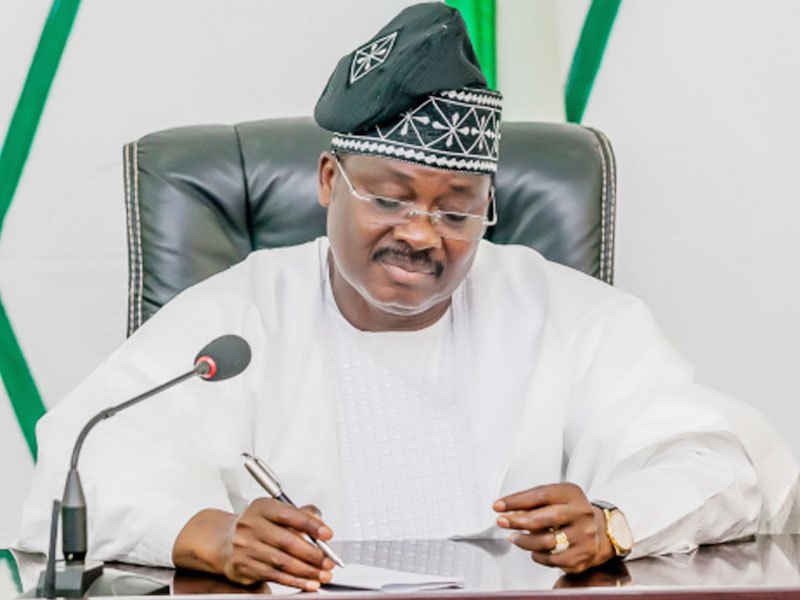Governor Ajimobi’s “Kings-Size” Headache
Francis Abayomi
Oyo state is truly living up to its slogan as Nigeria’s Pacesetter’s state. The historic city of Ibadan, the capital of Oyo state is witnessing a bazaar of award of kingships; a development that has been aptly branded as “koseleri” (a Yoruba interpretation for ‘strange happening’ or ‘abomination’). Interestingly, “koseleri” as brewing crisis of confidence believed to have been instigated by politics is coming across as sequel to the infamous “constituted authority” catchphrase of the state’s Chief helmsman, Governor Abiola Ajimobi. The news of the approval of no fewer than 30 kingships and the subsequent installation of over 20 of them in one fell swoop was initially received with bated breath of disbelief and apprehension.
However, the development appears to have since spiralled into mute unease whose import could only be determined in the fullness of time. Olubadan whose authority is at the centre of the Ibadan’s lesson in the much-talked about national reform agenda in Nigeria has only expressed objection with guided trepidation which further makes the development rather touchy. It is important to appreciate that governor Ajimobi as a full-blooded indigene of Ibadan could not be said to be neutral in the whole saga. The governor is probably deploying his political authority into influencing local politics to the advantage of vested interests in relation to Ibadan chieftaincy custom. It is recalled that the ascendancy of the current Olubadan was characterised by strange disagreement considered unusual and antithetical to kingship ascendancy in Ibadan which was before then reputed for the non-contentious and peaceful order of succession. It is therefore not unlikely that the stage for the ongoing restructuring may have been set with that unusual and disturbing development.
As it stands at the moment, it is not certain how long and tenaciously the Olubadan and a handful of chiefs who appear to be in the minority could hold on to maintaining their opposition against Ajimobi’s chieftaincy reform that has led to the installation of hitherto bead-wearing high chiefs as crown-wearing kings. Although the Olubadan stool is also said to have been elevated to a rather gratuitous position of His Imperial Majesty from the rank of Royal Majesty that now goes with the Obaship elevation of members of Olubadan in Council who also interestingly still maintain their erstwhile titles in council. As a friend who is an indigene of Ibadan told me during the week, post-Ajimobi era would likely define a new momentum for the crisis rather than quieten the unease.
Meanwhile, the development in Ibadan is not without strange dynamics that can hardly wait to be fully exorcised before governor Ajimobi vacates office in May 2019. The development out-rightly contradicts long held belief in Yorubaland that the palace is made for only one king at a time who is expected to preside with his chiefs who are bound by the authority of the king who is the paramount head of the kingdom. Are the new kings in Ibadan obliged to leave their crowns and authority of office behind while paying obeisance to Olubadan? How would these new kings preside over their domains that are yet to be made autonomous domains or clearly define communities hitherto under exclusive authority of Olubadan? How would the new kings preside in their palaces (assuming there are) with chiefs who are currently not in existence? It would appear the government of Ajimobi appears is yet not done with reform as the domains of the new Obas require functional palaces with chiefs whose limits and confines of responsibilities must be defined for administrative purposes.
There is no doubt that some major stakeholders in Ibadan welcome and applaud the development as dream comes true. It must however be understood that the mixed-feelings elicited amongst stakeholders within Ibadan chieftaincy institution could not have been any different considering the stakes attached to the reform regarding elevation to the prestigious rank of Obaship. It however remains to be seen how prepared Governor Ajimobi and by extension Oyo state government are in contending with the exigencies of the emerging dynamics of chieftaincy reform which is likely to gather unintended momentum in the months to come. If it could rightly be argued that majority of stakeholders in Ibadan are at home with the reform, the poser remains whether the government took into account the implications and uncertainties of this rather seemingly far-reaching but evidently and clearly crisis-laden reform.
What the immediate future holds for Ajimobi’s bold restructuring of chieftaincy custom in Ibadan could only be imagined. Maybe there are yet chances yet that the reform will eventually endure after fears and apprehension may have probably taken the back seat after Ajimobi’s tenure. But before then, we can only hazard guesses as to the imperativeness or needlessness of Ajimobi’s kings-sized headache as it appears at the moment. Ajimobi may be dogged enough to contend with his self-inflicted headache by holding firm to damnation of opposition as his countenance to the objection of Olubadan seemed to have confirmed thus far. But only the future could determine if immediate or future administration in Oyo state would be readily prepared to shoulder the baggage of consequences of the actions of government of the day.

